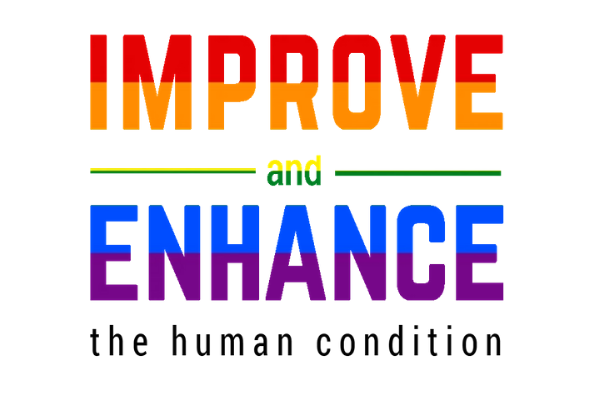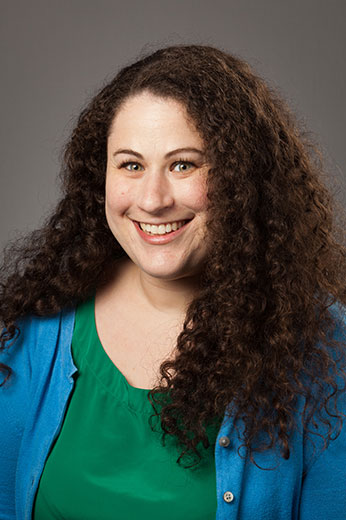
Faculty members are prioritizing conversations surrounding sexuality and gender to help identify gaps in literature
Human Development and Family Sciences faculty are finding ways to increase conversations about important LGBTQIA issues. Whether they are teaching a class or leading a research lab, their efforts aim to fill the gaps that are seen in today's literature, media, and even relationships.
Dana Weiser
 Associate Professor, Dana Weiser, Ph.D., teaches HDFS 2322: Intimate Relationships
and HDFS 3321: Human Sexuality. As part of her teaching strategy, she incorporates
the latest research and curriculums in society and critiques them with the class.
Associate Professor, Dana Weiser, Ph.D., teaches HDFS 2322: Intimate Relationships
and HDFS 3321: Human Sexuality. As part of her teaching strategy, she incorporates
the latest research and curriculums in society and critiques them with the class.
"I continuously discuss diverse sexual and gender identities and thread research with LGBTQIA persons throughout these courses," Dr. Weiser said. "The idea underlying this approach is to hold up all identities as equally valued rather than relegate LGBTQIA individuals to one section of the course. For example, when discussing sex education I critique the heteronormativity of many sex education curriculums, when discussing sexual violence I highlight the higher rates of experiencing sexual violence for LGBTQIA individuals (particularly LGBTQ+ women of color), or when covering adolescent sexual identity development I discuss identity development for heterosexual and LGBTQIA individuals."
When constructing in-class activities or exams, Dr. Weiser says she tries to call attention to the gaps in the research literature. Often, she has found that the research has only been studied through heterosexual individuals and couples.
Outside the classroom, Dr. Weiser is a co-organizer of the Sexism | Cinema Film Series, which is a collaboration with Alamo Drafthouse and several Texas Tech faculty members. Before COVID-19 caused many theatres like Alamo to shut down, a movie featuring a woman-identified protagonist was screened on the first Wednesday of the month.
"Following the movie, an expert speaker or panel of speakers, lead a discussion in the movie theater to unpack how gender, race/ethnicity, class, and sexuality are portrayed in film as well as their own research."
Elizabeth Sharp
Human Development and Family Sciences Professor and Director of Women's and Gender Studies, Elizabeth Sharp, Ph.D., teaches an undergraduate and graduate course on gender development.
"Because sexuality identity, behavior, and expression is frequently linked to gender, sexuality is explored and examined throughout the course," Dr. Sharp said.
 In addition to her teaching role, Dr. Sharp works with groups of undergraduate and
graduate students in the Gender SEAMS lab. In all of the group's projects, gender and sexuality are common threads in their
studies.
In addition to her teaching role, Dr. Sharp works with groups of undergraduate and
graduate students in the Gender SEAMS lab. In all of the group's projects, gender and sexuality are common threads in their
studies.
"One project we are currently working on is an examination of effect and space of LGBTQIA college students," Dr. Sharp said. "Working with Ben Finlayson, a Ph.D. student in Couple, Marriage, and Family Therapy, we recently applied for funding for the project. We are interested in how LGBTQIA identified students feel in certain spaces (e.g., classroom, residence halls, sports areas) and if some spaces are more welcoming or feel 'safer' than others on campus. What occurs in those spaces? How can campus make spaces more welcoming and inclusive for all students?"
As the Director of Women's and Gender Studies (WGS) program at Texas Tech, she works alongside many faculty researching LGBTQIA issues.
"Last year, WGS along with the Humanities Center at TTU, hosted a Queer Theory workshop, opened to all university students, staff, faculty and community members. Dr. Michael Faris was the featured speaker. WGS also brought in a national scholar-in-residence who focused on queer and intersex identities. Additionally, Women's and Gender Studies hosts the Annual Colloquium on Gender & Sexual Identities every October."
